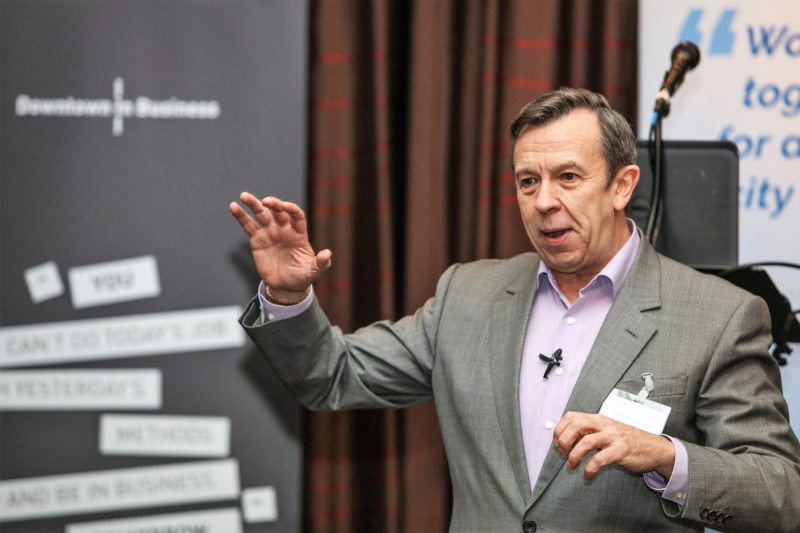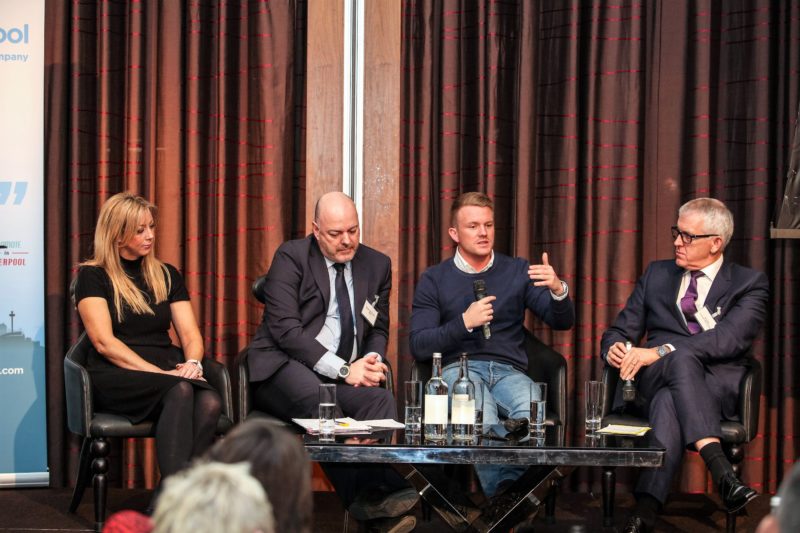Five things we learnt at the Limitless II conference
Last Friday YBNews attended the Limitless II conference at Liverpool’s Hilton Hotel. The half-day event was organised by Downtown in Business and the programme boasted a range of speakers from the digital, sports, lifestyle, financial and professional services sector.
Speakers drew on their own experiences in business to provide hints and tips on how to develop a high-growth, ‘limitless’ mindset. Here’s what we learnt.
To be limitless, you have to think limitless
Such is the claim of Michael Finnigan of i2i, who commenced the morning’s proceedings.

Mike presented an argument that success requires 10% capability and 90% attitude – and says your choices affect your behaviour and ultimately, your growth.
Mike drew on a number of examples and anecdotes that gave testimony to his mind over matter theory, “take Helen Clitheroe,” he began.
I2i worked with the Olympic athlete during the run up to the 20212 Olymipcs. During this time – after some time out due to plantar fasciitis – 37 year old Helen shaved 24 seconds off her personal best when training for the 5K.
Mike continues: “Helen proves that if you want something, with all your heart and all your desire, then you can go and get it.”
The lending landscape is changing
Melanie Fourie from peer-to-peer lending company Ratesetter and Gordon Merrylees from NatWest painted a picture of the lending landscape, both through traditional and non-traditional borrowing streams.

Gordon Merrylees said: “Gone are the days when lending was always through the bank. The culture around accessing finance today is far more open and transparent.”
Luke Massie, one of the regions most talked-about entrepreneurs agreed.
Luke started out in business at just 17, now aged 23 he has three successful businesses under his belt – including fan-to-fan ticketing platform Vibe Tickets.
Vibe Tickets surpassed Ticketmaster in its first month operating and has since gone from strength to strength, leveraging a unique place in the market.
Luke has financed the business through a mix of means, including council funding, finance through banks, private investors and more recently crowdfunding. He says: “We like the crowdfunding model as it allows our loyal customers who share our vision be part of the journey.”
Failing to prepare is preparing to fail
40% of Britons would like to be self-employed, according to Gordon Merrylees, who added:
“There’s a real rising tide in Liverpool in terms of enterprise and entrepreneurship – an appetite and a confidence that wasn’t here 10 years ago. This means it is more important than ever to make sure we are supporting and preparing entrepreneurs for the world of finance.
“Does your idea solve a problem? Is it disruptive? Is it scalable? – these are all things that investors will want to know.”
Giving back goes a long way
“Giving something back is fundamental to good business and instilling best practices across the board” suggests Steven Jackson, founder of Recycling Lives.
Recycling Lives offers support to disadvantaged adults within their community through providing accommodation, education, training and work experience to homeless and long-term unemployed individuals, with the aim of rehabilitating them back into a normal, everyday, working life.
Steven said: “The potential to impact and improve lives is a far greater driver than any monetary ambition.
“We are approaching the £40m turnover mark at Recycling Lives and we maintain a 10% social commitment on value of turnover. It is the social value of our business that I’m most proud of – and it is what defines us.”
In 2013, Steve was awarded an OBE for services to employment and the community in Lancashire.
Charity begins at home
Nisha Katona, the brains and driving force behind Indian restaurant group Mowgli; and Paul Bibby, managing partner of Liverpool law firm MSB concluded the day and talked about the importance of a valued workforce.
“Work for many people can be a place of solace, which is why at Mowgli, we manage with love,” began Nisha.
“Our staff know from their very inception that there are opportunities to grow with us. I have worked hard to instil a nurturing – almost maternal environment, where respect is key.”
Paul Bibby added: “I believe there are three things key to creating a successful business – integrity, empathy and continuity.
“Lead with actions, not just words – put your money where your mouth is, reward the efforts of your employees and take them with you on your journey.
“Understand their challenges and remove barriers – demonstrate that opportunities for progress and self-development are uninhibited.
“In turn, you’ll have a loyal, committed team who are eager to stay and grow with you – which in turn, benefits your customers.”
